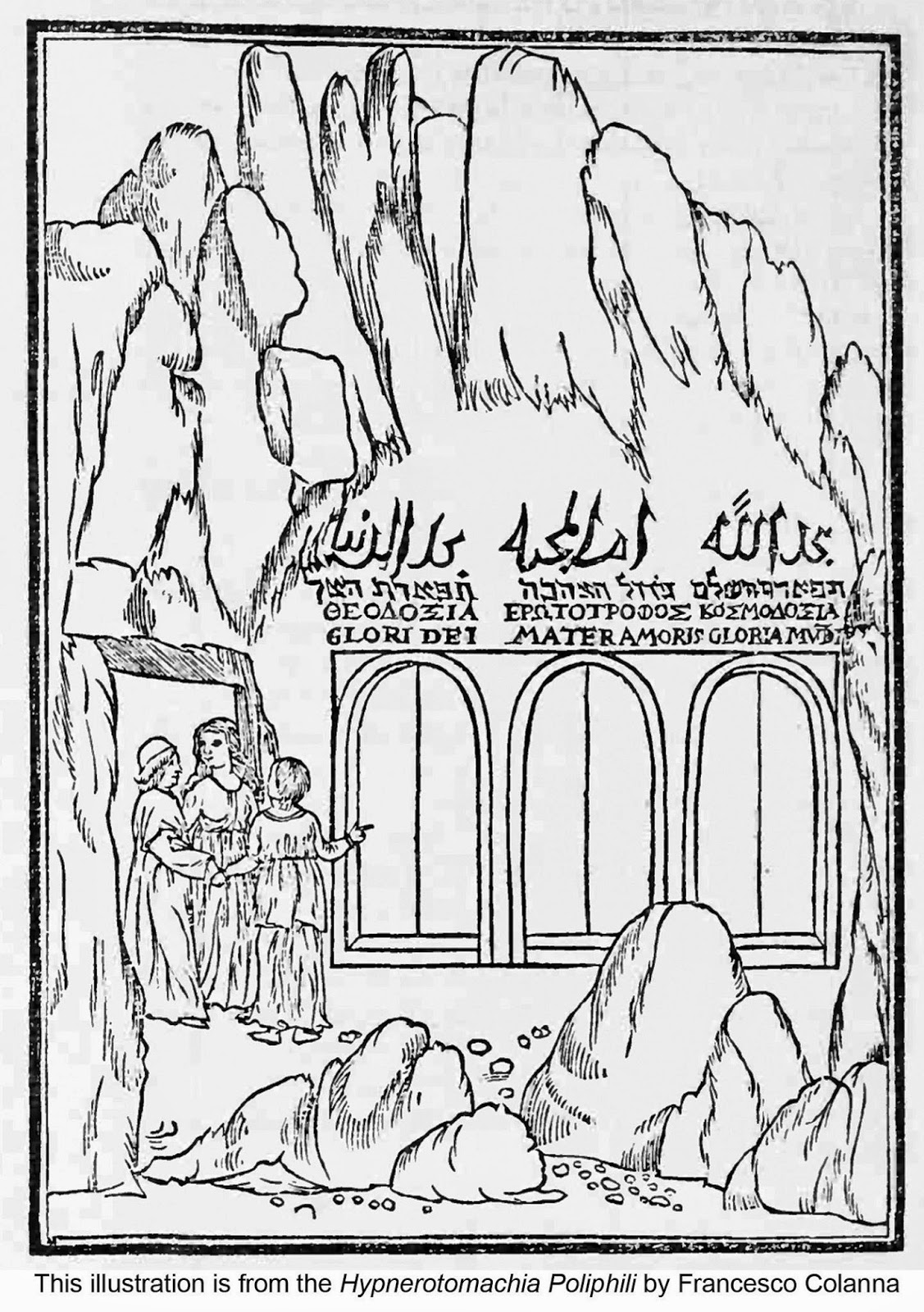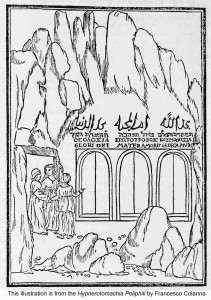The following excerpt from noted author Jason Miller’s latest book, “Sex, Sorcery, and Spirit: The Secrets of Erotic Magic” represents a story from the West, which in the book immediately follows a story from the East: the origin of the Guhyasamaja Tantra. The two stories taken together demonstrate the importance of this mode or work.
A Story from the West
Chances are that unless you are entirely new to the concept of sex magic, you know that Aleister Crowley practiced it as part of his religious and philosophical system known as Thelema—a Greek word meaning “will and desire.” Crowley was inspired by Francois Rabelais, who wrote about an Abbey of Thelema in his book Gargantua and Pantagruel nearly 400 years before Crowley established his own version of such an abbey in Cefalu, Sicily, in 1920. What fewer people know is that Rabelais’s use of the term was most likely inspired by a chapter within one of the most enigmatic books of Western literature: The Hypnerotomachia Poliphili, which translates as “Polifilo’s Strife of Love in a Dream.”1 This book was printed anonymously in Venice in 1499 and uses a very difficult linguistic style that is a combination of Italian, Greek, and Latin. It is attributed to Francesco Colonna because the first letter of each chapter spells out POLIAM FRATER FRANCISCVS COLVMNA PERAMAVIT, which translates as “Brother Francesco Colonna has dearly loved Polia.”
Most believe that this reveals the author to be a Dominican monk who preached at San Marco Cathedral during the time that the book was published. Some Scholars believe that the book was written by a different Colonna who was a Roman Governor at the time, and yet others attribute it to the famous Lorenzo de Medici.
The book recounts the tale of a man named Poliphilo, which can loosely be translated as “lover of all things,” and his search for his true love, Polia, or “all things.” The quest takes him through ancient temples, secret lakes and alcoves, enchanted forests, and mysterious portals. All through the book he marvels and waxes poetic about the beauty he finds not only in the many women and nymphs he meets, but also in the architecture, landscape, and sculptures he encounters. Truly a love of all things. At one point he encounters the Queen Eleuterylida (loosely translated as “free will”), who instructs him to choose between three portals to continue his quest. To lead him to these portals, the queen assigns two nymphs: Logistica (reason or logic) and Thelemia (will or desire). A long journey ensues, during which Logistica offers lots of explanation and advice to Poliphilo, while Thelemia says little by comparison. Eventually they arrive at an impenetrable pass where three brazen portals are carved into the side of the living rock. Each portal is marked with an inscription in Arabic, Hebrew, Greek, and Latin.
The first portal is marked with the words Gloria Dei in Latin, Theodoxia in Greek, Tif’eret ha-El in Hebrew, and Jal Allah in Arabic. These all translate to “Glory of God.” The three travelers knock on the portal and a shriveled old matron dressed in rags comes out to greet them. The road through this portal is stony and covered in thorns and brambles. Logistica, seeing that Poliphilo was not interested in this portal, tried to encourage him to take it, saying, “This path is not known until the end is reached.” Thelemia, however, advised him, “O Poliphilo, the love of this laborious woman is not yet for you.”
They knock on the second portal, which is marked with the words Gloria Mundi in Latin, Cosmodoxia in Greek, Tif’ret ha-Olam in Hebrew, and Jal Ad-Dinya in Arabic. These all translate to “Glory of the World.” They are again greeted by a matron, but this time she is strong, with powerful arms, and holds a golden sword with a crown and palm branch suspended from it. She and her maiden attendants radiate the strength that is only developed after prevailing in combat and trial. Logistica begins to sing a song in praise of this path: “ O Poliphilo, do not shrink from the manly combat of this place, for when the labour is past, the reward remains.” Her song is so vehement that Poliphilo is ready to walk through this portal and face whatever trial awaits. Thelemia caresses him and gently reminds him, “It seems sensible, Poliphilo my pet, that before you stay here you should at least look at the third portal.”
The third portal is marked with the words Mater Amorisin Latin, Erototrophos in Greek, Gidul ha-Ahava in Hebrew, and Um el-Mujaba in Arabic. The meaning of these is “Mother of Love” or “Nurturer of Love.” Once in the portal they are met by a joyful young woman whose wanton gaze captures the attention of Poliphilo immediately. The path behind her is a voluptuous garden overflowing with abundant beauty, food, drink, and of course nymphs. Logistica warns Poliphilo not to be sucked in by “a feigned and cosmetic beauty, deceitful, insipid, and vain.” She warns that there will be heartbreak and pain and death and all manner of disappointment and poison if he takes this path. Logistica goes on and on like this for some time, but Thelemia simply glances at him and makes a gesture that he should not listen to Logistica. Logistica gets angry, throws down her Lyre, and runs off. Thelemia assures Poliphilo, “This is the place, Poliphilo, where it will surely not be long before you find the thing you love most, the thing that is yours, the one thing in the world which your obstinate heart unceasingly thinks about and hopes for.”
So Poliphilo, led by the coquettish women, passes through this portal, where, after a short rest, he resumes his quest. Eventually he finds Polia, who rebukes him, causing him to die. Polia is then encouraged by the Goddess Venus herself to love Poliphilo, so she returns and kisses him, which returns him to life. She and Poliphilo resolve to devote themselves to love and the works of love. They embrace, Polia disappears, and Poliphilo wakes up from his dream.
This story represents the first use of the term Thelema to indicate a path that represents the personal will, as opposed to the will of an external god as a spiritual path.2 It specifically rejects the idea that one needs to choose between a life of renouncing passion and pleasure to know god, represented by the Theodoxia gate, or a purely material life driven by success, power, and conquest, represented by the Cosmodoxia gate. Instead one can embrace passion and pleasure and eventually come to know Polia—All Things.
***
These two stories represent a subtle teaching on the philosophy behind sexual magic, and the place it holds in the greater scheme of spirituality. Both stories represent a path that can lead to realization faster than paths of renunciation and asceticism. They also represent paths that can be hazardous: Logistica was not wrong about the dangers of the third gate, and there is a reason that the Buddha was not teaching the Guhyasamāja Tantra widely in India, or even to the 500 Arhats that accompanied him.
Despite the dangers, though, in Indrabhuti the Buddha saw a sovereign who could handle the teaching and really could attain enlightenment in no other way. Thelemia saw the same in Poliphilo. There are many who feel that the old ways of religious asceticism are no longer the most appropriate method of spiritual expression for our planet. Simple materialism has also failed us, and seems to bring us further and further from real fulfillment and realization as a species. The first and second gates have failed. Perhaps it is time to walk through the third.
Jason Miller (Inominandum)has devoted the last 23 years to traveling the globe and studying practical magic in its many forms. He is the author ofProtection and Reversal Magick,The Sorcerer’s Secrets, andFinancial Sorcery. He also runs the Strategic Sorcery Training Course and Strategic Sorcery Blog. He lives with his wife and children in the New Jersey Pine Barrens, where he practices and teaches magic. His popular blog can be found at www.inominandum.com/blog.



